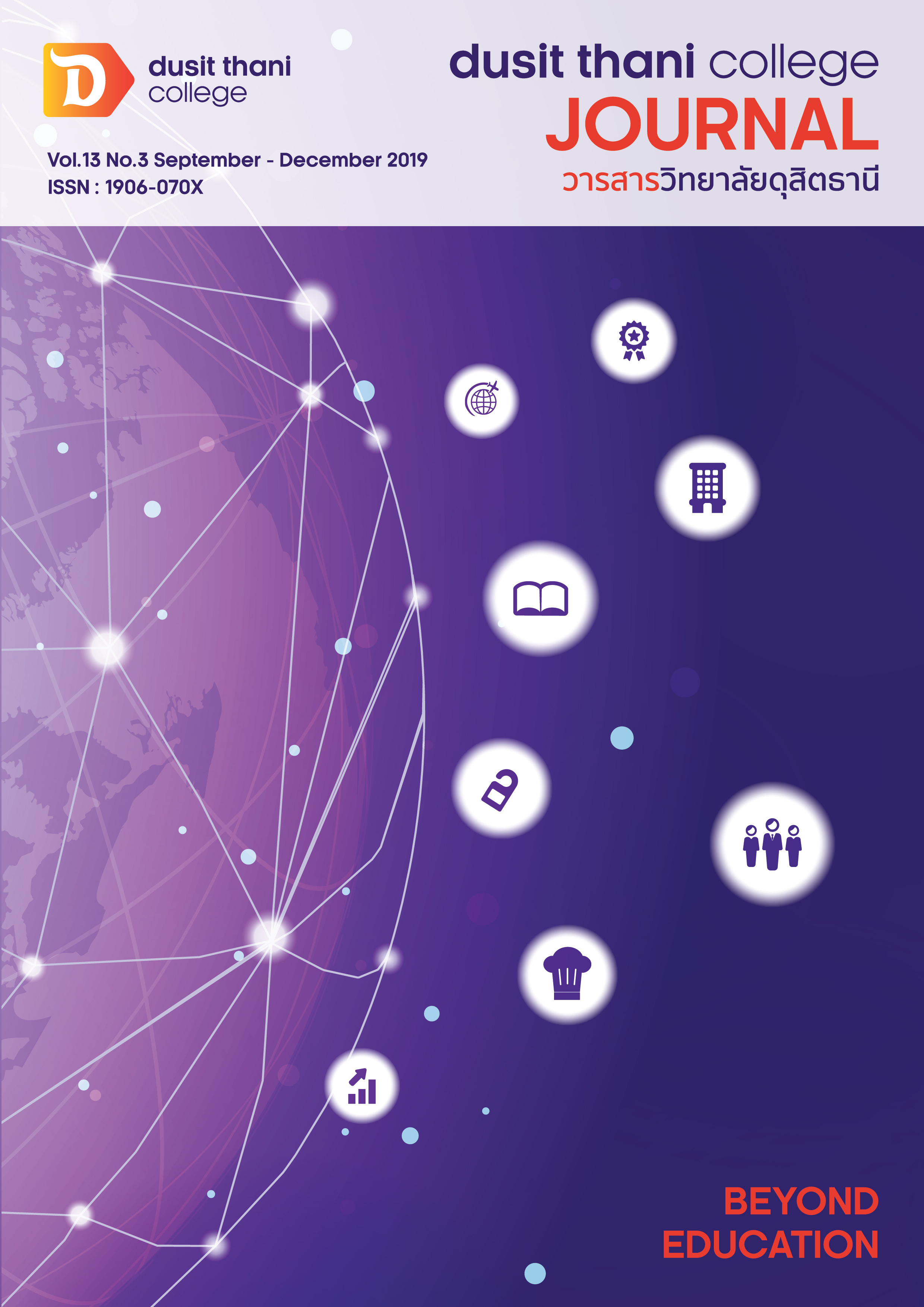Model of Human Resource Development in the Spa Business to Promote Wellness Tourism for Senior Tourists
Main Article Content
Abstract
The purpose of this research were (1) to study the current condition of personnel development in spa business to promote wellness tourism for senior tourists (2) to synthesizing the personnel development model in the spa business for promote wellness tourism for senior tourists. This research was a Qualitative research, collected information by in-dept interviews. the key informations by puposive sampling from government, spa operator and senior tourists. Research findings showed that Human Resource Development in the Spa Business focus on developing knowledge and service capabilities and service quality standards for employees by using teaching and self-learning. The increased compensation as an incentive to motivate employees to develop themselves. Tourism promotion not have a program to senior tourists but use the selection of skilled service personnel and have experience in providing services to senior tourists, senior tourists will have confidence The senior tourists hope that the service personnel can talk with them while providing services, and create an atmosphere
Article Details
Article Screening Policy
- All research and academic articles to be published must be considered and screened by three peer reviews in the relevant field / article.
- All articles, texts, illustrations and tables published in the journal are the personal opinions of the authors. Editors don't always have to agree. And no responsibility whatsoever is the sole responsibility of the author.
- The articles to be published must never be published. Where did you first publish? And not in the consideration of other journals If the audit found that there has been a duplicate publication It is the sole responsibility of the author.
- Any article that the reader sees as being plagiarized or impersonated without reference. Or mislead the work of the author Please let the journal editor know it will be your greatest blessing.
References
2. Delahaye, B. L. (2005). Human Resource Development: Adult Learning and Knowledge Management: Milton :John Wiley & Sons Australia, Ltd.
3. Department of Intermational Trade Promotion. (2017).Thai spa business. Retrieved from: http://www.ditp.go.th/contents_attach/143532/143532.pdf.
4. Esichaikul, Ranee and Chansawang, Rochaporn. (2017). A Study of Polentials of spa businesses in thailand. Modern Management Journal 18 (1) : 17-32.
5. Gillry, J. W., Eggland, S. A. and Maycunich. A. G. (2002) Principles of Human Resource Development. Cambridge, MA: Perseus Publishing.
6. Kaevatana Yossavadee. (2015). Thai Spa Development toward Sustainability Service Psychology Method. Acedemic Journal Bangkokthonburi University. 4(1) : 174-184
7. Madhyamapurush, Warach. (2013). Tourism Marketing for Long Stay Japanese Pensioner Tourists in Chiang Mai. Journal of Thai Hospitality & Tourism. 8(2): 48-61.
8. Ministry of Public Health. (2013). Knowledge document Health spa operator . Nonthaburi. Bureau of Sanatorium and Art of Healing. Department of Health Service Support.
9. Nakpathom, Parinya and Taweephol, Rachanon (2018 ) SERVICE QUALITY DEVELOPMENT OF TOURISM FOR THE SERNIOR TORISTS. Valaya Alongkorn Rajabhat University under the Royal Patronage. 12(1 ), 264.
10. Patikorn, Sutavee and Jangsum, nakamon. (2012). THE DECISION MAKING TO USE THE SPA SERVICE OF MIDDLE AGE PEOPLE IN BANGKOK .Finance Investment Marketing and Business Management. 2(4), 221-222.
11. Ratanapaiboonchai, Jirawadee (2014) Senior Tourists Market: Thai Opportunity grow to receive AEC. Retrieved from: http://www.itd.or.th.
12. Rupjumlong, Pornphatu .(2009) .Policy framework for health Wellness Tourism Promition Thesis. National Institute of Development Admistration.
13. Siriwaiprapan, Somsri and Soonthonsmai, Vuttchi (2016). A Collaborative Human Capital Development Model for small spa and thai Massage business in Pataya. Modern Management Journal 14(1), 82.
14. Siriwong, Phitak.,et al. (2016). Changing Higher Tourism Quality in the Western Region for Senior Tourist towards ASEAN Community. The office of the National Research Council of Thailand (NRCT) and The Thailand Research Fund (TRF).
15. Swanson, R. A., and Holton, E. F. (2009). Foundations of Human Resource Development. San Francisco, CA: Berrett-Koehler Publisher.
16. Tourism Authority of Thailand. (2012). Wellness Tourism. Retrieved from: http://www.thaitravellhealth.com/blog/archives/3440.
17. Trumikaborworn, Suree and Apinandacha, Chupasiri.(2016). Development of Senior Health Promotion Tourism in Mae Khong River Cultural Lifestyle Model(Sa-Som Village), Ubon Ratchathani Province Journal of Nursing Science
Chulalongkorn University. 28(1), 25-40.
18. Wattanakamonchai, Somyot and Yeion, Yaowalak (2010). Senior Tourists : A Market with Potential for the Tourism Industry .Panyapiwat Journal, 2(1), 95-103.
19. Wongtongdee Sripatsorn. (2014).Human Resource Development. 2nd ed Bangkok: Vprint.


